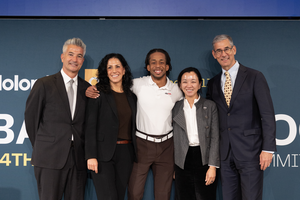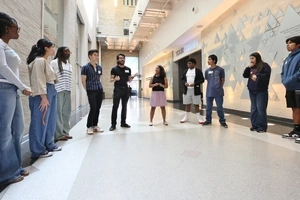The jobs of educators are among the most difficult to automate, Dr. James Lester said in a keynote celebrating the launch of the McGraw Center for Educational Leadership, but artificial intelligence (AI) still has massive potential to transform classrooms.
Lester, Distinguished University Professor of Computer Science and Director of the Center for Educational Informatics at North Carolina State University, kicked off the conversation about AI at the event last Thursday, June 8, which also included a panel discussion, Q&A session, two short “lightning” talks from GSE students, and a reception. Among the crowd were GSE faculty, staff, as well as current students and alumni of many of the school’s leadership programs. Also in attendance were outgoing Penn GSE Dean Pam Grossman, incoming Dean Katharine Strunk, inaugural Executive Director of the McGraw Center (and McGraw Prize winner) Cheryl Logan, and members of the McGraw family.
The launch event was organized and led by Catalyst @ Penn GSE Executive Director Michael Golden, who also oversees the McGraw Prize in Education. Golden noted in his opening remarks the impact the McGraw family has had on the School, including their foundation’s record-setting gift to Penn GSE that helped make the McGraw Center possible.
During his presentation, Lester cited a study showing education near the top of the list of industries that would be the hardest skillsets to automate through AI.

“The kinds of jobs we do require skillsets—we know this—that are very hard to train,” he said. But due to the rapid growth in the field, he noted that AI will soon provide a whole new set of tools for educators to incorporate into their work to have greater impacts on students than ever before.
“It’s clear that the underlying technologies are moving along so fast, it’s going to be possible to develop student supports and create such engaging student learning experiences, that we never could have done this before. It just would not have been possible,” he said. “And, because of the way these models work, we’re going to be able to do them at scale.”
Lester pointed to individualized interventions for students as a prime example of the types of learning experiences that will most benefit from AI. We’ve known for a long time that tutoring, adaptive coaching, and other individualized learning approaches are very effective, he said. But they are not very affordable or scalable. To overcome these challenges, it has been a major goal to develop AI-empowered tutoring to complement classroom instruction.
Lester predicted that AI will one day be so ubiquitous in the classroom that it will be invisible, as he showed the audience a graphic depicting a classroom that looked very similar to any classroom you might see today.
“So where’s the AI? You can’t see it because it’s everywhere,” he said. “It is going to be so much like water to fish, that pretty soon it’s going to kind of disappear.”
While this technology can have a huge positive impact on education, Lester warned that it is not “a beautiful vision that can’t go wrong,” as its implementation will bring with it important ethical concerns and challenges, not least of which is access to it for all communities. Educators, he noted, have the vantage point and ability to “insist we make this technology available to everybody.”
“You are going to be sitting in the seats where you can make real decisions, and some of these are going to be procurement decisions,” he said. “But some of them are going to be policy kinds of decisions that can make an incredible difference for how people learn for the next generation.”
Photos by Holden Kent Blanco for Penn GSE
Media Inquiries
Penn GSE Communications is here to help reporters connect with the education experts they need.








